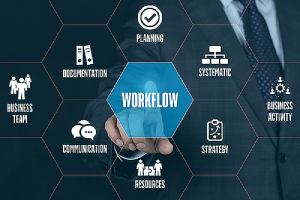The insurance industry as a whole has always been a complex web of processes, regulations, and data-intensive tasks. As customer expectations rise and the need for streamlined operations becomes more pronounced, insurance agencies find themselves at a crossroads to either adapt and innovate—or be left behind by the competition.
This is exactly where custom Enterprise Resource Planning or ERP solutions, tailored specifically for the unique demands of insurance agencies, can help your company. These solutions can integrate and automate core business functions while simultaneously presenting new avenues for improved customer engagement, data management, and decision-making.
Insurance agencies can achieve greater operational efficiencies, foster deeper client relationships, and continue to remain competitive in an ever-evolving marketplace by leveraging custom ERP systems throughout their organization.
What Are Insurance ERP Solutions?

Unlike traditional software that might only manage one aspect of business operations, insurance ERP solutions oversee a wide array of functions at once, including policy administration, claims management, finance, customer relationships, and even human resources—all tailored specifically for the needs of insurance providers.
These systems help provide a holistic view of the entire insurance operation by centralizing data from different departments, making data easily accessible and actionable.
Furthermore, given their modular architecture, insurance ERPs can be customized to fit the unique requirements of each insurance agency, offering flexibility and scalability as the company grows and the industry evolves.
Key Capabilities Of Insurance ERP Software
Insurance ERP solutions come equipped with a robust set of capabilities designed to address the multifaceted needs of the insurance industry. Effective claims management is at the forefront of these, which provides end-to-end support for the complete claims workflow, from the initial report to its resolution.
Automation greatly enhances employee productivity and the overall customer experience while also incorporating advanced analytics that can help play an important role in identifying and mitigating any potentially fraudulent claims.
Moving to the underbelly of insurance operations, underwriting is another pivotal area addressed by ERP solutions. The software streamlines this complex process, ensuring that regulations are strictly followed, and any potential errors are minimized.
With predefined rules and guidelines in place, tasks such as risk assessment and premium quote calculations are automated, leading to more consistent and efficient results.
ERP is more than managing claims and assessing risks. Insurance providers manage a plethora of policies every single day, and efficient policy management capabilities centralize all policy-related information.
Everything is managed seamlessly, whether it’s quote management, policy storage, distribution, or tracking. Additionally, with rigorous access controls, insurers can ensure that every piece of data is secure and accessible only by authorized personnel.
When it comes to the often hectic and fast-paced insurance industry, companies can’t overlook or understate the importance of efficient task management. ERP solutions automate an array of task-related processes, which help optimize workflows and collaborations between departments.
With a custom solution, tasks are planned, scheduled, and assigned efficiently, with clear visual indicators showing any completed activities, upcoming duties, or overdue assignments.
ERP software solutions also place a significant emphasis on effective user management. In an industry where sensitive data is the norm, ensuring secure and swift access for authorized users is an important thing to keep in mind. Not only does this aid in compliance with regulatory mandates, but it also helps minimize the potential for any possible information breaches.
On the logistical side of an insurance company’s operations, supplier management tools within the ERP help optimize interactions with your third-party providers. From automated work order creations to efficient scheduling, these tools help ensure that resources are utilized optimally, leading to cost savings and increased customer satisfaction.
As the backbone of any modern operation, proper document management is another important component of insurance ERP solutions. With capabilities for storing, organizing, and swiftly accessing vital documents, insurers can operate more efficiently and with renewed confidence.
Furthermore, functionalities such as global searches, electronic signatures, and automated data backups further enhance the security and efficiency of document-related tasks.
How Insurance ERP Solutions Benefit Insurance Companies
One of the most significant advantages of insurance ERP solutions exists in their ability to drastically improve customer service personalization. With immediate access to reliable and consolidated customer data, insurers can create tailored, customer-centric experiences, which help enhance interactions while optimizing sales funnels by leveraging automated marketing activities.

But the benefits don’t end there; with a complete 360-degree view of your company’s operations, insurance ERP solutions foster an environment of synergy and collaboration between different departments. Aided by the ERP, this interdepartmental collaboration helps automate many time-consuming tasks, which in turn helps accelerate your decision-making processes.
The ripple effect of this is evident in the empowerment of advanced analytics initiatives that enable insurance companies to glean insights from their data as never before. Ultimately, all of these factors come together to help drive business growth and elevate overall business profitability, positioning insurance companies for success within the industry.
The Role Of ERP Software In The Insurance Industry
As the digital revolution continues to sweep across different industry sectors, insurance agencies must adapt to a shifting landscape, and custom ERP solutions are central to this process. They help bridge the gap between traditional practices and more contemporary demands by integrating with online portals, mobile apps, and even cutting-edge IoT devices.
Yet, the power of ERP extends beyond mere digitization, as its modular design gives insurance companies the agility to either roll out new product offerings or tweak existing ones, all in response to the industry’s ever-changing market dynamics. This nimbleness ensures that insurers can consistently deliver products that resonate with the times.
The surge of Insurtech firms using tech-centric models has cast a formidable shadow over traditional insurance behemoths, but more traditional players can counteract this challenge by adding ERP systems to their arsenal. These solutions equip them with a technology toolkit comparable to the disruptors, allowing them to stand their ground and compete effectively.
The globalized nature of today’s business means that many insurers have either already spread their wings internationally or harbor such aspirations. ERP systems are their trusted allies in this endeavor. Tailored to support a wide array of languages, currencies, and regulatory frameworks, they ensure that all global operations are all harmonized, compliant, and efficient.
Collaboration is another domain where ERP systems shine—whether it’s interdepartmental interactions, multi-branch communications, or liaisons with brokers and other external entities, having an integrated platform ensures streamlined operations. With everyone referencing the same data sets, miscommunications become a relic of the past.
Boasting intuitive interfaces, mobile adaptability, and user-centric portals, ERP systems help place power in the hands of the workforce. Regardless of position or location, every member, from field agents to top-tier executives, can access essential data, execute functions, and make informed decisions.
Custom Insurance ERP Software Integrations
Integrating different custom software solutions with ERP software can help elevate your company’s operational efficiency to new heights. Let’s explore some of the primary custom ERP software integrations that can really benefit your company:
Claims Management Software
Merging insurance ERP software with claims management software offers an enriched processing system, curbing manual data entry, enhancing data accuracy, and uplifting overall efficiency. This kind of integration helps ensure comprehensive claims management, from initiation to settlement, all while maintaining industry regulatory compliance.
Policy Management Software
The amalgamation of insurance ERP software with policy management software further simplifies policy-oriented tasks, reduces manual interventions, and refines data accuracy. This integration empowers insurers to handle policies proficiently throughout their lifecycle while adhering to industry norms.
CRM Software
Linking insurance ERP with CRM software helps enhance the potential for increased and higher-quality customer engagement. This type of integration helps simplify processes across your company, from policy issuance to servicing, maximizing your opportunities for cross-selling and enhancing overall customer satisfaction and retention.
Quoting Software
The fusion of insurance ERP software with insurance quoting software fortifies operational efficacy. Reducing manual data input, ensuring data veracity, and providing a comprehensive view of customer interactions help streamline the entire process from quote generation to policy issuance, enabling insurance firms to deliver better service and make informed decisions.
Workflow Automation Software

Leverage a Custom Insurance ERP Solution From Orases
As we’ve explored throughout this article, insurance ERP solutions offer a transformative approach to managing insurance operations, from claims to customer relationships.
These solutions help streamline your organization’s processes while also ensuring that insurance companies can provide personalized, efficient services to their customers—but choosing the right partner to develop a custom ERP solution can make all the difference, which is exactly where Orases can help.
Renowned for their custom insurance ERP solutions, Orases is committed to understanding your vision and tailoring a solution that aligns with it. If you are ready to get started, schedule your no-obligation consultation now, where you’ll have a 30-minute, no-pressure conversation to outline your aspirations and goals for your company.
Don’t leave the future of your insurance company to chance; contact Orases today to turn your vision into a reality. Call us at 1-301-756-5527 or visit us online to get started today.






